Home > Assembly Elections > Interview
The Rediff Election Interview/Uma Bharti
November 27, 2003
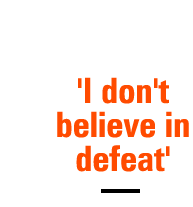
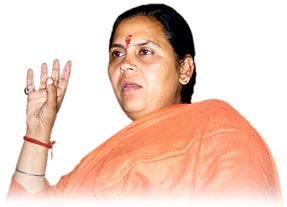
Ab main sone jaau?" ("Shall I go and sleep now?")
Uma Bharti, the Bharatiya Janata Party's chief ministerial candidate in Madhya Pradesh, asks politely.
It is close to midnight, she has had a busy day of campaigning and spent almost an hour speaking to party workers, well wishers and rediff.com before seeking permission to retire for the day.
The guest house in Sagar where she is staying the night is full of people. They surround her as she sits in her orange sanyasin robes, chatting with her over cups of tea and coffee.
Tired as she is, Uma Bharti is a perfect host.
She makes sure your coffee has the right amount of sugar and you are dropped to the train station comfortably to make it for the 12:05 am train.
A fiery orator, who shot to fame during the Ayodhya temple movement a decade ago, Uma Bharti successfully made it to the second rung of the BJP's national leadership and has tremendous grassroots appeal.
Her stature ensured her inclusion as a minister in each one of Atal Bihari Vajpayee's three governments at the Centre. Now the party has entrusted her the responsibility of delivering Madhya Pradesh -- the state from where she has won a seat in Parliament five times -- for the BJP.
In an interview to Senior Associate Editor Archana Masih, she says she is 200 percent confident of a victory for the BJP, vehemently denies abandoning the temple cause and explains there is no word in the dictionary to describe the hell that her state has become.
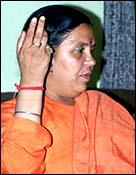 You have fought so many electoral campaigns for a seat in Parliament, how different is this election? Is it special?
You have fought so many electoral campaigns for a seat in Parliament, how different is this election? Is it special?
I have worked hard with equal zeal in every election. The only difference is that this time even I am involved in the election (as a candidate for the legislative assembly). Otherwise, the hard work, contact with the people, the number of meetings -- are almost the same.
You are a member of Parliament, what difference do you find in contesting for a Lok Sabha seat as opposed to a seat in the state assembly?
The issues are different some times.
See, in this assembly election, development and governance has become the issue.
What do you tell people, what do they tell you during your present campaign?
I remind them of the failures of the (Digvijay Singh) government. I give them the promise what maximum we can do for them.
How confident are you of being the chief minister?
I don't think about me being chief minister, but I do think of forming the government here. That the BJP is going to form the government. I am very confident. 200 percent.
What is this confidence based on?
Based on people.
What are they telling you, where are you gauging this from?
See, you are talking to a person who is not confined to an air-conditioned room. Who is in contact with the local people for 24 hours. They talk to me about their problems and I am always aware of it, like I am aware of your presence.
What are their biggest problems?
Roads, electricity and employment are their biggest problems.
How many seats do you think the BJP will win this time?
I don't count the seats. I just see the sentiment of the people that they want to root out the government.
What is your campaign schedule like? How hectic is it? How many meetings do you have?
You are talking to a person who has been on the road since the age of 6. My schedule is almost the same. I am ready at 7.30, then I leave at 8 and I come back in the night at 11 and sleep.
Sometimes I attend 10, 15 meetings, sometimes I attend 8. All national and state leaders are giving their time. They are going place to place, and are addressing gatherings.
If you do become chief minister, what issues will you tackle first?
Pressing problems are many. But the problem that has to be sorted out immediately is power shortage. Then there are equally important problems like bad roads, unemployment, law and order. Immediate attention is required by bad roads and electricity.
How long do you think it will take to fix this?
The temporary solution can be done in three months, but the permanent solution will need one year -- that is for the power shortage. For the roads, it may require more than 18 to 22 months. For unemployment -- around three years.
You have known Madhya Pradesh since you were a child, what is so special about this state?
I am born in this state. The people here are very peace loving. I am also peace loving and simple at heart. People are very cooperative. It is really unfortunate that one belt in this state is totally criminalised.
Which belt?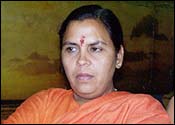
The UP border. Then Bhopal, the capital, has become the hub of terrorism. The Akshardham mishap in Gujarat -- the culprits were traced to Madhya Pradesh. The blasts in Bombay in 1993, they were also traced to Bhopal. Any link with any terrorist activity in India, the links are traced to Bhopal. Abu Salem, his links were traced to Bhopal. This happened in 6, 7 years.
Ten years ago, the BJP was in power. Are things better than what they were at that time?
You have to talk to the people. They are living in hell. I think worse is not the word to explain the situation. You have to find another word in the dictionary. 'Worse' is a very mild word to explain the situation.
How has projecting you as a chief ministerial candidate impacted this campaign? There is great thrust being put on your being a woman.
I think the trend in politics has changed a bit. People want to see ideology as well as a leader. I think that must have helped.
But there are so many leaders?
Again this is a question that I should not answer. I cannot. Because then you want me to talk about myself which I will not do.
What are the things you are directly supervising?
Everything. Because I am the head of the election management committee so I have to see everything. I am not alone. There are thousands who are working with me. They are situated in different places. Hundreds are in Bhopal; they are on the divisional level, at the district level. There is a network. The block will inform district, the district will inform division, the division will inform state. In case of any emergency, they will straight talk to me.
You say people are complaining about bad roads, but the BJP has nothing to show the people either. Does it?
We have many things to show them. We have the Pradhan Mantri Sadak Yojana (Prime Minister's road programme). It is specially thought by the prime minister and designed by the central government.
We do have credibility. Then from 1977 to 1980, the Janata Party government, they are the ones who created the roads in Madhya Pradesh. Then again from 1990 to 1992, the governance of [Sunderlal] Patwaji was very good. So it's the credibility. We are not talking hollow. We have a base when we talk.
Do you think people remember that period at all?
They do, they do. They remember it too well. That's the reason for the support of the BJP here. You think people's memory is that short that they will forget what happened 10 years back? Not in India at least.
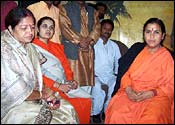 But power shortage did not become acute till recently.
But power shortage did not become acute till recently.
Then you talk to people na? Why are you talking to me about this?
No, I'm asking you.
Then I'm giving you the answers and you accept the answers.
Because in the last ten years, it mustn't have been so bad. It must have become acute in the past few years?
No, it's been bad in the last ten years. Things became bad to worse and now there is no word in the dictionary.
One criticism held against you is that you are a sanyasin who is fighting an election battle for power, when you should be meditating?
I do my meditation also. I don't do meditation 24 hours. No sanyasi does meditation for 24 hours!
But no sanyasi does politics also for 24 hours?
But they do social service. I am doing social service. For me it's social service. You perceive it as politics, but I see it as social work. A kind of social work for me. Those who are calling me this are not liberals. They have to purify their mind and hearts. Their interests are hurt, that's why they are talking nonsense. They have been exposed by me.
How religious are you? What is Hinduism?
I don't have to prove how religious I am but Hinduism is the life of this nation. I strongly believe in Hinduism.
And what is it?
It's a way of life. It's a philosophy -- to be a better human being.
You are seen as person who held the Ayodhya Mandir movement very close to your heart but seem to have abandoned it for a while.
No, I have not. Whenever they call me, I will go there. See, we are a group. We take collective decisions. The collective decision was taken that I am going to look after the state, so I am going to look after the state.
That time I was told to look after the Ayodhya movement, so I was looking after the Ayodhya movement. But I still believe that mandir should be constructed in the place of Ram Lalla. My belief has not changed.
But do you believe that because you have got the responsibility of an entire state, the Ayodhya movement has been pushed…
I am not the only one involved in Ayodhya. There are millions and millions.
But you are an important pivot there.
I still believe in it. I have not abandoned it. It's a belief na? Like you are a woman, but if you are a doctor and doing some surgery, it's not as if you have abandoned your womanhood. Your beliefs have not changed.
Belief remains same. The responsibility has changed.
After a long hard day of campaigning, when you look back, do you ever think – what if we don't make it?
No, I don't think this. You are talking to a super cool, confident person. I am an ideology-based person. For me there is no defeat.
Then what is defeat?
For me there is no defeat. I don't believe in defeat. My ideology should succeed.
What then is your ideology?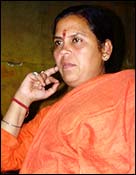
To serve people.
Does it not make it difficult to serve people if you are not in power?
No. I don't know about others but I can serve people anywhere and in any field. When you are in power you can do things in haste and hurry. You can change policies.
What about your own constituency that you are contesting from -- how do you assess it?
That constituency belonged to me since my childhood. I don't have to assess it.
What are the drawbacks there?
Same as the rest of Madhya Pradesh. Bad roads, power shortage, unemployment, poverty.
Is there any part of Madhya Pradesh that you have not visited?
No. I think I have visited all places.
I'm sure you've not travelled on the road we did today [Bhopal to Bina]?
I always travel by road. Only in the day during elections I am travelling by helicopter. See these people (surrounding her), ask them.
I have travelled on a road that is worse than yours. I took two hours for 18 kms.
They are sitting behind you, they will not say no.
He's a noted journalist from the state. He's not an ordinary person and he's not known to be our admirer. It's his freedom. He can write his comments on me but he cannot humiliate me. Nobody has the right to humiliate you or me. That I don't allow.
What are the BJP's weaknesses in the state?
That I will discuss in the party forum and not with a journalist.
EARLIER INTERVIEW: 'When they see me, even chain smokers stub their cigarettes'
Photographs: Jewella C Miranda. Image: Uday Kuckian